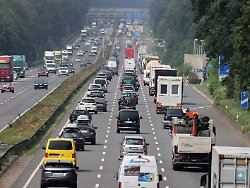Wednesday, September 1st, 2021
Fuel up to eight cents more expensive
The CO2 price puts a greater strain on poorer drivers
Since the beginning of the year, a ton of CO2 has cost 25 euros – and that has already increased the price of petrol by seven to eight cents. Frequent drivers are relieved by the commuter flat-rate, but drivers with low incomes in particular benefit too little from it, warns the consumer advice center.
According to a new study, the price of carbon dioxide on fuel is the biggest burden on low-income households. This emerges from an expert opinion commissioned by the Federation of German Consumer Organizations (vzbv). Accordingly, the measures adopted so far to compensate for higher fuel prices are not sufficient to relieve low-wage earners more than households with higher incomes.
A consideration for the year 2021 showed according to the consumer advocates that the group of the highest income 30 percent get more than a third of the additional costs back. In the lower half of the income, on the other hand, only 10 to 17 percent of the increased mobility costs would be offset. The study was carried out by the Protestant Study Community Research Center (FEST) and the Forum for Ecological-Social Market Economy (FÖS).
vzbv board member Klaus Müller called on politicians to give in. “Households with low incomes are suffering from rising fuel costs and urgently need political support,” said Müller. Among other things, the association proposes a significant expansion of local public transport and an income-independent mobility allowance.
“The calculations of this study show that these measures are not sufficient,” says the report. “Low-income households in particular hardly benefit or not at all.” According to the authors of the study, the unequal relief effect between the income groups is primarily due to the commuter allowance, from which higher earners would benefit more because of the higher marginal tax rate. In addition, the researchers looked at two further measures to compensate for rising CO2 prices: the lowering of the EEG surcharge and the introduction of a mobility premium from the 21st kilometer.
The study describes the social impact of the CO2 price, which has been in effect since January 1, on oil and gas. It is currently 25 euros per tonne of CO2; the price is set to rise further over the years in order to make the use of fossil fuels in transport and in buildings less attractive in terms of more climate protection. The current surcharge has so far made refueling more expensive by around seven to eight cents.
.
